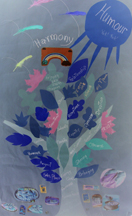The Learning Circles Project |
||
| Ardoch First Nation and Allies by Janice Brant |
||
Ardoch Algonquin First Nation, OntarioArdoch Algonquin First Nation (AAFNA) is an Anishnabek community that is located in the Madawaska, Mississippi, and Rideau watersheds. Several families compose the AAFNA and share a desire to preserve Algonquin language, culture, and territorial jurisdiction. The Algonquin people at Ardoch and in the surrounding territory are a living and dynamic people who have occupied the area for at least 3,000 years. Over time the Algonquin people have adapted to a wide range of conditions and have been influenced by many events. Today they remain a strong and distinct people working together to maintain their rich history and culture. The AAFNA strives to maintain many objectives from the preservation of families and kinship ties to social, ceremonial, and traditional practices. AAFNA also promotes the value of learning circles, in particular, those that support the retention of the Algonquin language, customs and worldview. This includes a strong focus on preserving, protecting and utilizing the wild rice beds. In 1981, the people of the Ardoch Algonquin First Nation along with their allies from Alderville, Tyendinaga, Curve Lake and Hiawatha fought a 27-day stand-off against Ontario to protect their jurisdiction and responsibility for the manomin (wild rice) which grows in the Mississippi River near Ardoch. The wild rice at Ardoch has been shared for over a hundred and thirty years with pickers from Alderville and Curve Lake. It is the manomin that was preserved from Rice Lake when the Trent Canal destroyed its habitat there. The “Rice Wars” as described by Randy Cota, helped to strengthen and unify the Ardoch community. On August 30th the Ontario Provincial Police (OPP) and the Ministry of Natural Resources (MNR) invaded the Ardoch community with over 50 police cruisers. Hundreds of police and MNR were employed in the operation and Algonquin people were threatened, arrested and pushed to the ground. The next morning, on August 31, the community dug up the road entrances to the Lake and liberated a part of the Algonquin homeland for 27 days. Harold Perry, an Elder and now the Honourary Chief of the Ardoch Algonquin First Nation, led the battle and the court cases that followed. In 1982, the Minister of Natural Resources admitted that there was an unsettled question of jurisdiction and that the Province had no right to impose its authority over the manomin. The challenge for the Ardoch Algonquin First Nation is its continued development as a strong community that is responsive to the needs of its 700 plus members. Algonquin values of trust, friendship, respect, mutual benefit, and compassion for others thrive in their community. These are a way of life, along with an enduring respect and responsibility for the land, all living things, and for one another. The oral traditions passed down by their ancestors inform the Ardoch Algonquin First Nation of their struggles and achievements. Ardoch is well on its way to reasserting this way of life, maintaining and preserving the rice beds for future generations. The Ardoch vision is to ensure that every person has the opportunity to gain the fullest education and to have access to traditional language and culture. Recognizing individual gifts and finding a place in the community for positive contributions is essential in building and maintaining a strong Algonquin identity. The Ardoch Algonquin community maintains a strong focus on the wild rice beds, hosting gatherings and events that engage in the protection and preservation of this sacred habitat. They continue to assert their political presence, Aboriginal rights and title to the sacred ecology that sustains the rice beds and Algonquin way of life.
Harold Perry and Randy Cota openly welcomed me to visit their community and experience the beauty of the wild rice beds. On a sunny fall morning, I drove into the community of Ardoch to find Randy Cota waiting along the road. As I pulled my car off to the side of the road I could see a humble building with a sign that read, Ardoch Algonquin First Nation. After greeting one another, Randy took me across the road to where a commemorative plaque had been erected looking over the river. The plaque paid tribute to the Rice Wars and the Ardoch community members who asserted their inherent rights against desperate odds to protect and preserve the rice beds for the generations to come. Harold Perry is a man of many talents and served as a guide and teacher while visiting the peaceful Ardoch community. He grew up in a time when boys took their guns to school so they could hunt on their way home. Sharing was a way of life and what you learned came mostly from your parents, aunts, uncles, and grandparents. Harold has seen many changes in his life and maintains that Algonquin people and their culture need to be recognized and respected. Harold has personally maintained a great amount of Algonquin knowledge and values. He is a canoe maker, hunter, fisherman and trapper. Most people know Harold as the guardian of manomin (wild rice). In 1979 Harold began a struggle with the Province of Ontario over the Aboriginal rights to wild rice in the Ardoch area that has had lasting consequences and brought a sense of renewal to Algonquin people. When Ardoch Algonquin First Nation challenged Ontario restrictions on Algonquin hunting in 1995, Harold was in the forefront. The struggles to recognize and restore the rights of the Ardoch community have taken Harold to the Supreme Court of Canada and it has not been an easy road.
Today Harold continues to represent his family at Family Heads Council. He is regarded as the Honourary Chief of AAFNA and he continues to speak his mind and be heard. Harold does his best to concentrate his energy on hunting, fishing, harvesting rice, and playing his guitar, while the community continues to rely on him for guidance.
Randy Cota has lived in the heart of Algonquin territory throughout his life along with his parents, brothers and sisters, all of whom are lifelong members of the Ardoch Algonquin First Nation. Randy has actively served his Nation with dedication and diligence for decades. He brings experience, skill and strong value to Aboriginal politics, and was appointed Co-Chief of the First Nation in March 2003. Randy has long carried with him the teachings of his Algonquin Elders and continues to advocate and promote the importance of Algonquin language and culture. He is an avid hunter and fisherman, trapping traditionally by dog sled on his trap line near his home. He provides for the elderly and shares the bounty of his hunting endeavors with the Ardoch community. Randy is also a member of the Ontario Provincial Police. He cares deeply about his community and has shown himself to be capable of making a difference. Randy and Harold continue to share their knowledge of the manomin with their community, visitors like myself, and especially the young people who are the future guardians of the rice. By way of oral tradition and example, they teach others how to harvest, dry, and dance the rice for cooking and storage. Harvesting the rice requires great skill and perseverance. It is hard work and involves not only a skilled canoeist but someone who has an intimate understanding of the sacred ecology. Their collective purpose is to continue the sacred relationship between the Algonquin people, the land, and creatures envisioned by the Creator, as well as to ensure that Algonquin people can exercise their inherent right to harvest fish, game, and plants (wild rice) within the traditional territories of the Algonquin Nation. They also strive to promote conservation of the natural resources that have sustained the Algonquin people so that they will be enjoyed by the coming generations. |
||

